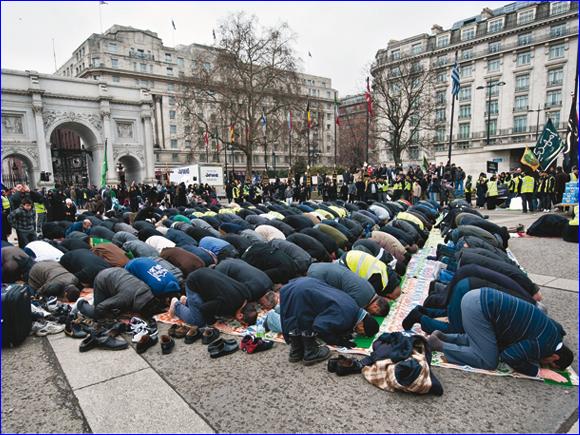


What is different about Western countries is that they are targets for increasing flows of Muslim refugees and migrants, fleeing the turmoil of the Middle East. 2015 had barely begun when Europeans were shocked to discover shiploads of largely Muslim refugees abandoned in the Mediterranean by people smugglers. A widely held sense of humanitarian compassion and concern, the legacy of deeply embedded Christian values, encourages many Westerners to champion the rights of such Muslim newcomers.
Nevertheless, not all in the West welcome the rapidly growing Muslim minorities across Europe, North America and the South Pacific. As these Muslim communities grow, so too does a militant extremist minority within the minority. In 2014 anti-terror raids on Muslim communities by police forces occurred across the West, of a kind that would never have been conceivable 50 years ago before the growth of these minority communities.
In short, an increasing sense of concern is palpable across Western countries. Late 2014 witnessed protest marches by thousands concerned about creeping Islamization across Germany. Local and national elections in France, Britain, Denmark, Sweden and elsewhere have seen the rise of right-wing groups voicing public concerns about increased Islamic influence, while majority political parties refuse to address this issue.
Western policies of multiculturalism are founded on the principle that immigration should not discriminate on the basis of nationality, creed, race or any other distinguishing feature among people. Yet such refusal to take account of the differences and oppositions that are essential to human nature mean that well-intentioned Western immigration programs are setting up the rivalries and conflicts of the future.
A case from Australia illustrates the dilemma. In the Melbourne suburb of Broadmeadows, the Shire Council, true to the principles of multicultural tolerance, approved the construction of a large Shi'ite mosque in 2013. However, in this instance, the proposed mosque will be located next to a house of worship of the Ancient Assyrian Church of the East. This church is home to many Christians who have fled Muslim persecution in the Middle East to find refuge in Australia. Such a hands-off policy in the approvals process, ignoring issues of community sensitivity and past history, reflects a naivete that bodes ill for future community relations. In this particular case, there were widespread protests by the resident Christian community, with a church poll indicating that 91% of the congregation will leave the church if the mosque construction proceeds. Such protests fell on deaf ears among members of the Victorian Civil and Administrative Tribunal, which issued a final ruling on the dispute in July 2014 (story).
How are Western countries to deal with the rapid growth of increasingly awkward Muslim minority populations? The solution is not to be found in turning off the taps that allow such immigration to take place; calls for a moratorium on Muslim immigration have been heard across the West in the past but have gained no traction and are unlikely to do so in the future.
Ironically, an answer for Western countries may exist within the Muslim world itself, in the form of policies towards residency and citizenship followed by the six Arab states of the Gulf Cooperation Council. These States -- Saudi Arabia, United Arab Emirates, Qatar, Bahrain, Oman and Kuwait -- have a combined population of 46 million people, of whom almost 50% are expatriates. Many of these expatriates have been living in these countries for several generations and, while they have residency permits which allow them to live and work, they do not have citizenship rights.
Western countries need to carefully consider the ramifications of present immigration policies which facilitate the early acquisition of citizenship, thereby tying the hands of authorities if some immigrant groups refuse to integrate. The record over the last 50 years suggests that Muslim minority communities do pose unique challenges to social harmony and integration. Western nations cannot be expected to turn away Muslim newcomers facing situations of distress and hardship, but they could consider lengthy periods with limited residential rights but not citizenship in order to assess the degree to which newcomers contribute positively to social cohesion. Today's Western political and social leaders owe nothing less to future generations.
Guest Editorial Policy

or register to post a comment.